Log In
View Upcoming Events
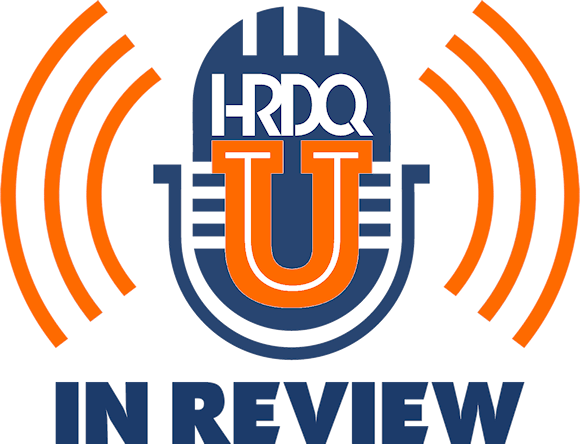
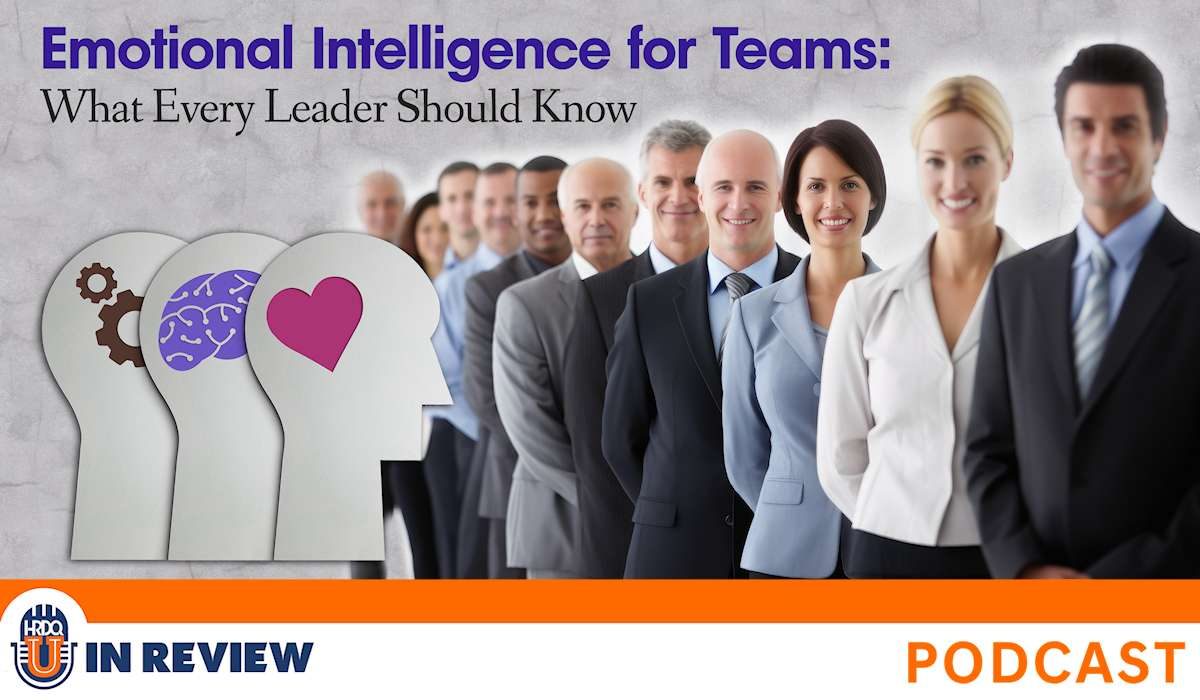
In this episode of the HRDQ-U In Review podcast, host Sarah sits down with leadership and organizational culture expert Devin C. Hughes to unpack the power of emotional intelligence (EQ) in leadership and in team dynamics. Drawing on 20 years of experience working with Fortune 500 companies and educational institutions, Devin shares why technical skills alone aren’t enough to succeed in leadership – and how understanding emotions is the real game-changer.
Devin defines emotional intelligence as the ability to recognize, understand, and manage both our own emotions and those of others. He challenges the myth that we’re “thinking machines that feel,” asserting instead that humans are “feeling machines that think,” and explains why this matters for leaders who want to build high-performing, connected teams.
Together, Sarah and Devin break down the five key components of EQ – self-awareness, self-regulation, motivation, empathy, and social skills – and show how each one contributes to trust, communication, and psychological safety at work. They also dive into the red flags of low EQ, like chronic miscommunications, conflict avoidance, and blame-shifting, which can erode team morale.
Listeners will walk away with practical strategies for staying emotionally regulated under pressure, including the five-second pause technique, naming emotions to tame them, and micro-moments of recovery to recharge throughout the day.
Chapters
Action Items
Tune in for an eye-opening conversation that will help you harness the power of emotional intelligence in leadership to lead more effectively and create a healthier, more connected team culture.
00:01
Welcome to this week’s episode of the HRDQ-U In Review podcast, where we bring you the latest insights and practical tools for enhancing soft skills training in your organization. This podcast is brought to you by HRDQ.com and I’m your host, Sarah, Learning Events Manager at HRDQ-U. Today, we’re joined by Devin C. Hughes to discuss the webinar Emotional Intelligence for Teams.
00:22
what every leader should know. Now, before we dive in here, be sure to subscribe to our newsletter at HRDQU.com for exclusive updates, upcoming webinars and resources to help you and your team excel. Devin, welcome. Thanks so much for joining me today. Thanks for having me. Super excited to be back with you. Now, to kick things off for our audience here, can you share a little bit about your background?
00:47
What drew you to focus on emotional intelligence, that you’re all about communication and happiness? Can you just share a little bit about what inspired you to be where you are today? Absolutely. So my background blends a little bit of leadership development, organizational culture, and human behavior. And over the last 20 years or so, I’ve worked with a variety of organizations from Fortune 500 companies to educational institutions.
01:14
helping teams, departments navigate change, improve communication, and foster a healthy workplace. And so what drew me specifically to emotional intelligence or EQ was a simple but powerful observation early in my career. The smartest people in the room aren’t always the most effective. I kept seeing high-performing individuals struggle. I mean, struggle, not because of lack of skill or knowledge.
01:41
or technical acumen because of the breakdown in empathy, self-awareness, and how they manage stress in relationships. And so emotional intelligence has become a through line in all the work I do now. Whether I’m facilitating a retreat, coaching the team, through conflict, the biggest breakthrough has always, always come when people learn how to better understand themselves and others.
02:09
And that’s when the light bulbs go on and real lasting culture change begins. Now we’re going to jump into some deeper questions here in just a moment. But for those who weren’t able to attend the webinar with us, can you give a high level overview of what emotional intelligence really means, especially in a team or leadership context? Yeah, I’m going to keep it brief because simplicity is elegant. Someone said to me earlier in my career, emotional intelligence or EQ.
02:37
is the ability to recognize, understand, and manage our own emotions, and the ability to recognize, understand, and influence the emotions of others. In a team, department, or leadership context, it’s not just a nice to have, it’s foundational. You see, many of us, including yours truly, were taught that we are thinking machines that feel.
03:07
That’s actually incorrect. Human beings are feeling machines that think. And knowing that, the ability to play in that sandbox to influence ourselves and others to drive outcomes, regardless of what industry, is a really, really big deal. And that’s what I was able to unpack a little bit on the webinar. And you broke emotional intelligence down into five key components.
03:34
Juan, can you share what those are? And two, which of those do you think leaders tend to struggle with the most and why? Yeah. So there’s five key areas and I’ll just, you again, I’ll touch on them and then I’ll put a little bit of context around it. So the first is self-awareness. And that’s really, really critical. Knowing what you’re feeling and why it matters. The next is self-regulation, managing emotions in healthy, productive ways. So not only are you aware of it, your own emotions, being able to self-regulate.
04:03
because again, sometimes we show up in spaces and we’re not the best version of ourselves because we’re in our emotions. The third is motivation, staying driven by our eternal values rather than external awards, keeping the main thing the main thing, doing the right thing. Fourth is empathy, understanding other people’s emotions and their perspectives. You hear a proverb, know, walk in their shoes. And then finally is social skills. All right, if you master the other four,
04:32
navigating relationships, communication and conflict effectively. So let me put a bow on that. So in leadership, high EQ or emotional intelligence, it builds trust, it reduces friction and it creates what we call psychological safety. In teams, it’s the difference between reacting and responding, between working in silos and collaborating effectively. When emotional intelligence is in the room, people feel heard, they feel valued and they’re more engaged.
05:00
which ultimately leads to better outcomes for everybody. And so many people think emotions and business don’t mix. What would you say to someone who believes that emotion should be left at the door? You know, it’s so funny. I hear that all the time. But this is what I’d say. Emotions are already in the room whether you acknowledge them or not. The idea that we should leave emotions at the door is outdated,
05:28
pretty much unrealistic. We’re human. We bring our stress, our excitement, our frustrations, our fears with us to work, whether we mean to or not. Ignoring emotions doesn’t make them go away. It just pushes them underground and compartmentalizes them where they can quietly impact performance, communication, team dynamics in ways we don’t always see right away. They’re still there. They just push to the side. So I say that to say this, leaders who recognize and work with emotions, not against them,
05:58
Let me say that again, leaders who recognize and work with emotions, not against them, are more effective at creating environments where people feel safe to speak up, take risks, be themselves. And that’s not about being soft or doing too nice. It’s about being smart. Emotional intelligence is a performance skill. It’s about creating clarity, reducing drama, making better decisions. So no, emotions don’t get in the way of business. They drive it. The best leaders that I know,
06:26
on the planet know how to harness that power instead of trying to suppress it. And one thing that stood out was how emotional intelligence can influence team communication and collaboration. What are some common signs that a team might be lacking in emotional intelligence? Yeah, so I get that all the time, right? So we’re trying to discern, this the high, know, what, like, for example, what is the EQ of the folks on our team? Right. So here’s some symptoms or signs that, again,
06:55
No judgment, just things to be aware of. On your team or department, do you have a frequent misunderstandings and miscommunications? If team members often talk past each other, make assumptions, react defensively to feedback, that’s typically a sign of low self-awareness and empathy. How about the avoidance of tough conversations? Does that happen on a team? Is it happening on your team? Teams that lack emotional intelligence tend to avoid conflict at all costs.
07:24
and it gets handled poorly. Issues fester, resentment builds, and trust erodes over time. A couple more, blame and finger pointing rather than take accountability. Low EQ teams deflect responsibility for fear, all right? So they blame, to play the blame game. Lack of active listening is another one that I see. People interrupt, they over talk, they multitask during meetings, they’re looking at their phone, banging on the keyboard.
07:50
Essentially, they’re just kinda sorta tuned out. It signals to the other people that they’re really not interested in what they have to say. And then finally, I guess the other sign I would say is low morale and disengagement. When people don’t feel seen, heard, or valued, they start to check out. That’s just a people problem. It becomes a performance problem. And you talked about using emotional intelligence to read the room. How can leaders get better at recognizing unspoken dynamics or emotional cues within their teams?
08:17
Yeah, so this is a big one, right? So I think oftentimes leaders come to me, Devin, I get it. Yeah, but how do I get better at it? So we use that language of reading the room. Well, a couple of different ways you can do it. Pay attention to body language and tone. For example, crossed arms, lack of eye contact, size, silence after big decisions, are all emotional data points when you notice those subtle shifts in energy. Watch what isn’t being said.
08:46
For example, like say you have a vocal team member who goes quiet or meetings that are filled with nods, but no questions. Oftentimes signals disengagement, discomfort, unspoken tension. Ask, don’t assume. The leaders that I work with that have high EQ, they’re curious, instead of jumping to conclusions, they ask open ended questions. How are you really feeling about this? What concerns haven’t we talked about yet? Other things would be create space for honest feedback. We need to the truth.
09:16
The truth doesn’t go away. If your team never pushes back or disagrees, you’re probably not hearing the full truth. And then finally, I would say reflect on your own presence. Sometimes the leader is the room. Yeah, sometimes the leader is the problem. If you walk in distracted, anxious, frustrated, unorganized, it changes the emotional temperature of everybody else. Self-awareness helps leaders at all levels set the tone instead of accidentally skewing it. So I’d say this.
09:45
Reading the room is less about having a superpower or a special gift. It’s more about slowing down, tuning in, and begin willing to look beneath the surface to what’s really going on. Now, say you’re in a high stress, oh, excuse me, say you’re in a high stress role or a fast paced environment, what strategies can someone use to help them stay emotionally regulated under that pressure?
10:11
Absolutely, so staying emotionally grounded under pressure is both a skill and a practice. so again, what I attempt to do is give people some science-based tools that they can actually operationalize in these environments. It’s one thing to know, right? It’s another thing to do. So the first I always recommend is pause before reacting. I call it the five second pause before you have a knee jerk reaction. Take a breath, name what you’re feeling and choose your next move intentionally.
10:39
a five second pause before you respond. Next, name it to tame it. Name it to tame it, putting language to what you’re feeling. For example, I’m frustrated, I’m overwhelmed, activates the rational part of the brain and lowers the emotional intensity. Third, focus on what you can control. In high stress situations, and we’ve been there, it’s easy to spiral. But what I found is leaders or people with high EQ ground themselves in what’s actionable.
11:09
prioritizing tasks, setting boundaries and letting go of what’s outside their control. Do what you can do. Number four, regulate your nervous system, right? So deep breathing, box breathing, grounding techniques, meditation, going for a walk, things like that to regulate the nervous system always helps. I’m a big person. I like to go on walks. I get outside, starts to soothe my nervous system. And then a couple of others, build micro moments of recovery. You don’t need a full re-vacation to reset because it’s probably unrealistic.
11:39
But again, short breaks, few minutes of mindfulness can reset. Again, 30 seconds, a couple of minutes, change the environment, get up, move around. I actually recommend building these micro moments of recovery throughout your day. And then finally, self-compassion. Too often, we’re very hard on ourselves. And being hard on yourself doesn’t make you stronger. It actually makes you more reactive. People with a high EQ give themselves grace and model it for their teams.
12:09
So staying regulated isn’t about being calm all the time, Sarah. It’s about learning to recover quickly and lead from a centered place, even when the pressure’s on. If someone wanted to start building their emotional intelligence today, what’s one small habit or practice that you’d recommend they try? And I’m going to give you the one that I have because again, we’re all so busy, busy, busy, busy. I would say this, a daily check in with yourself. Now.
12:38
how you start your day and how you end your day have a demonstrative impact on how your day plays out. So, what does that look like in terms of action? Take two to three minutes each day, maybe first thing in the morning or right after a meeting and ask yourself three questions. What am I feeling right now? Where do I feel it in my body and what might be causing it?
13:05
The small act of tuning in, I find, builds self-awareness, which is the foundation of emotional intelligence. And when you can name your emotions, you’re less likely to be ruled by them and you’re more likely to respond with clarity, intention, and compassion. One small habit, but I find big ripple effects in terms of my emotional intelligence and my performance and how I show up in spaces each day. And finally, Devin, where can listeners go to connect with you and learn more about your work?
13:34
Absolutely. So you can find me certainly online, on LinkedIn, all over social media, but I guess the best place is my website. That would be devinchues.com. D-E-V-I-N-C-H-U-G-H-E-S.com. And I write, speak, research all of the above around this and many other topics in the space.
14:00
And if you would like to hear more on this topic, make sure that you click the link in the description so you can check out the webinar that Devin just recently presented on this topic. Devin, thank you so much for your time today. Thanks for having me. This is a really, really important topic, so I appreciate us creating some dedicated time to talk about it, especially right now where we are. So thank you for having me.
14:21
Absolutely. And we hope you enjoy listening to the HRDQ-U In Review podcast available on all major streaming platforms. If you did enjoy today’s episode, make sure to give us a follow and leave us a five-star review. That’s how we were able to produce this weekly content for you. Thank you all for tuning in to this week’s episode of the HRDQ-U In Review podcast brought to you by HRDQU.com.

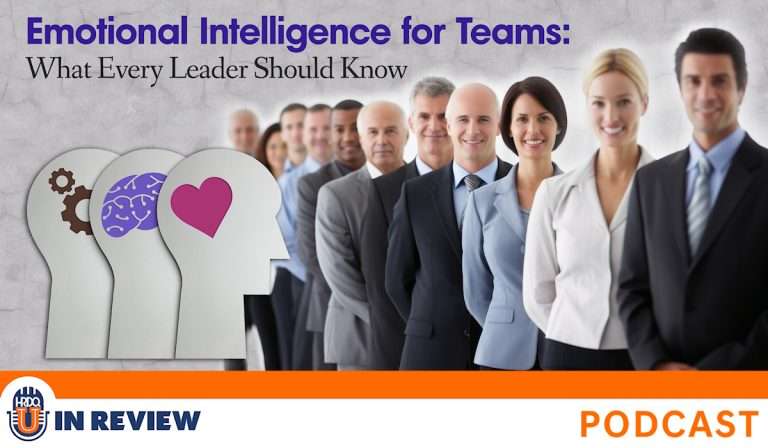
Listen to this podcast event at no charge with your
HRDQ-U Free Access Membership
In this episode of the HRDQ-U In Review podcast, host Sarah sits down with leadership and organizational culture expert Devin C. Hughes to unpack the power of emotional intelligence (EQ) in leadership and in team dynamics. Drawing on 20 years of experience working with Fortune 500 companies and educational institutions, Devin shares why technical skills alone aren’t enough to succeed in leadership – and how understanding emotions is the real game-changer.
Devin defines emotional intelligence as the ability to recognize, understand, and manage both our own emotions and those of others. He challenges the myth that we’re “thinking machines that feel,” asserting instead that humans are “feeling machines that think,” and explains why this matters for leaders who want to build high-performing, connected teams.
Together, Sarah and Devin break down the five key components of EQ – self-awareness, self-regulation, motivation, empathy, and social skills – and show how each one contributes to trust, communication, and psychological safety at work. They also dive into the red flags of low EQ, like chronic miscommunications, conflict avoidance, and blame-shifting, which can erode team morale.
Listeners will walk away with practical strategies for staying emotionally regulated under pressure, including the five-second pause technique, naming emotions to tame them, and micro-moments of recovery to recharge throughout the day.
Chapters
Action Items
Tune in for an eye-opening conversation that will help you harness the power of emotional intelligence in leadership to lead more effectively and create a healthier, more connected team culture.
[ PODCAST PLAYBACK ]
You must be signed-in with your membership account to access this content.
Enjoyed this podcast? Have suggestions on how we can improve? Please take our quick survey and receive a coupon for 15% OFF any of our individual membership plans.
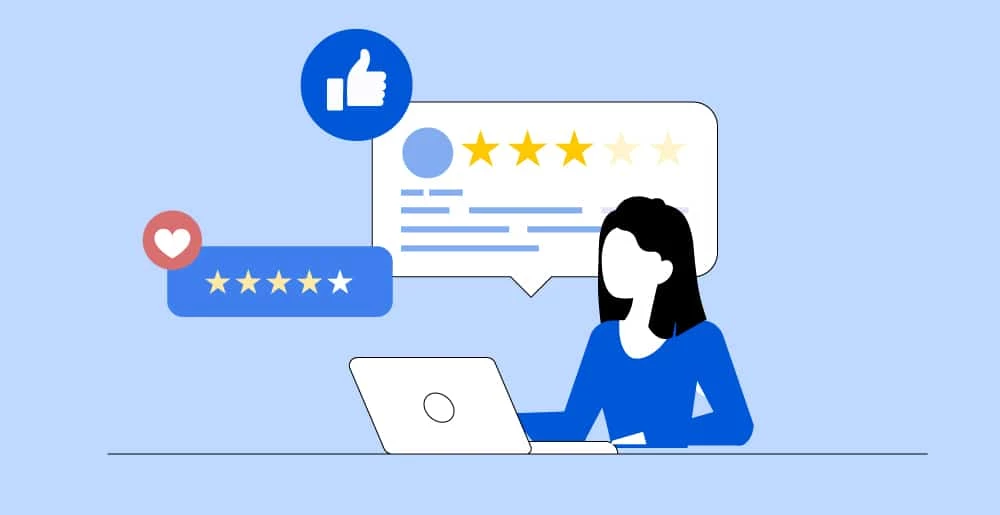
*Instant 15% coupon available upon completion of survey.
Want to learn more? Become an Individual or Corporate member to watch this and hundreds more webinars!
Master emotional intelligence for teams to boost communication, reduce conflict, and build stronger, more connected teams that thrive in today’s workplace.
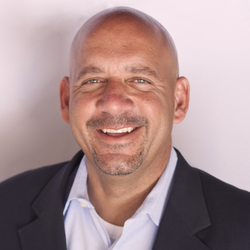
Devin C. Hughes
Devin C. Hughes is an award-winning speaker, best-selling author, and internationally recognized expert in the science of happiness, organizational/culture change, and leadership development. He has lectured and worked with a variety of Fortune 100 companies, as well as the Secret Service, the IRS, and an assortment of profit and nonprofit organizations. Devin is the author of 21 books and has lectured in more than 15 countries. He lives in San Diego, California, with his wife, four daughters, and their beloved rescue dog, Tyson. Connect with Devin on Facebook, X, Instagram, and at www.devinchughes.com.

Training Tools for Developing Great People Skills
This event is sponsored by HRDQ. For 45 years HRDQ has provided research-based, off-the-shelf soft-skills training resources for classroom, virtual, and online training. From assessments and workshops to experiential hands-on games, HRDQ helps organizations improve performance, increase job satisfaction, and more.
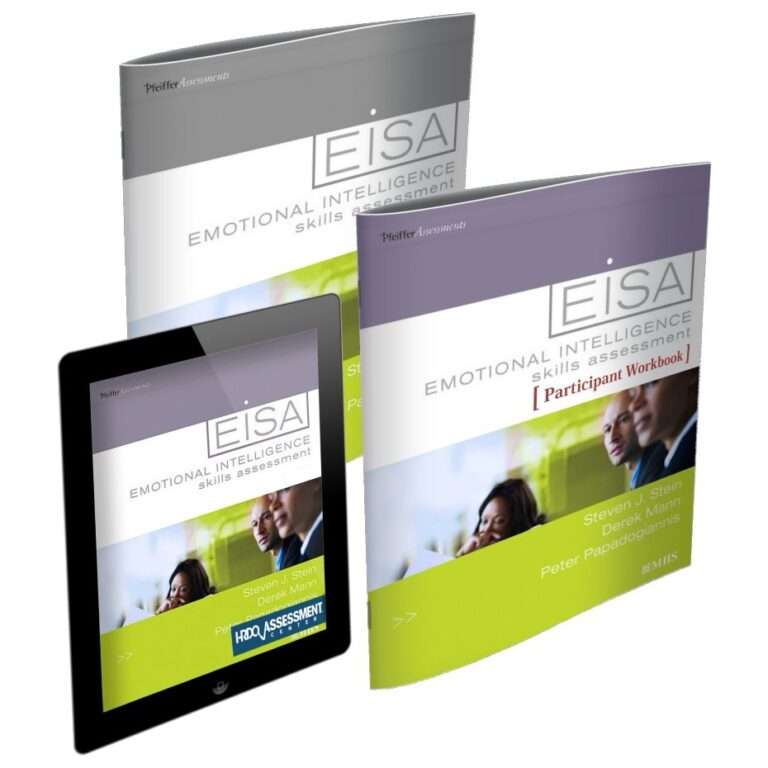
Emotional Intelligence Skills Assessment (EISA)
Discover your leadership potential by assessing emotional intelligence across five key dimensions: self-perception, self-management, decision-making, achievement, and interpersonal influence. These areas empower leaders to enhance self-awareness, capitalize on strengths, and identify areas for growth.
Buy at HRDQstore.com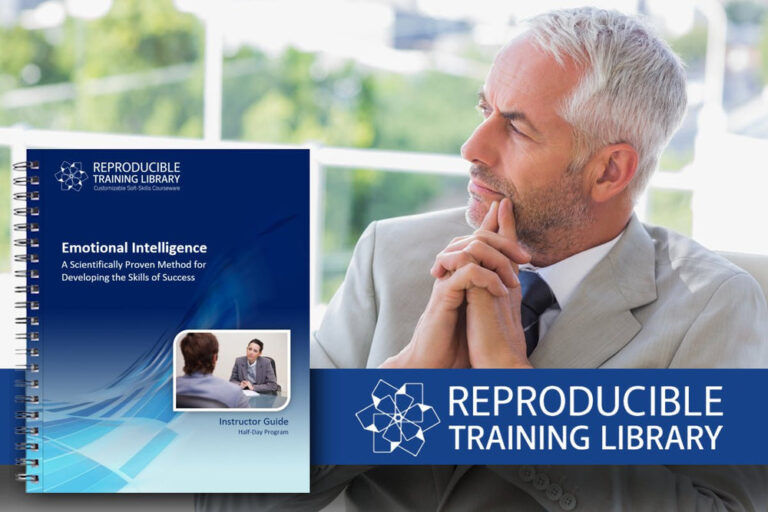
Emotional Intelligence Customizable Courseware
Explore the four key elements of this vital soft skill – intrapersonal skills, interpersonal skills, adaptability, and resilience – and discover practical strategies for strengthening each. Learn how to address challenges, solve problems, and navigate change and stress with confidence and clarity.
Buy at HRDQstore.comThe HRDQ-U In Review Podcast, brought to you by HRDQU.com, brings you the latest insights and practical tools for enhancing soft-skills training in your organization. As a learning community for trainers, coaches, consultants, managers, and anyone passionate about performance improvement, we interview subject matter experts and thought leaders from recent webinars they presented with us to take a deeper dive into the content they shared and answer all your questions. Join us as we explore new ideas and industry trends, share success stories, and discuss challenges faced by professionals.
The HRDQ-U In Review Podcast is intended for HR and training professionals, organizational development practitioners, and anyone interested in improving workplace performance and productivity.
New episodes of HRDQ-U In Review are released every week.
The length of the episodes varies, but they typically range from 15-30 minutes.
The podcast covers a wide range of topics related to HR and organizational development, including leadership development, team building, communication skills, conflict resolution, employee engagement, and more.
No, HRDQ-U In Review is completely free to listen to.
You can listen to any available HRDQ-U In Review Podcast right on our website at HRDQU.com via our embedded Spotify player on the related webinar page. In addition to our self-hosted option, you can find the HRDQ-U In Review Podcast on many of the popular streaming services, which are listed above.